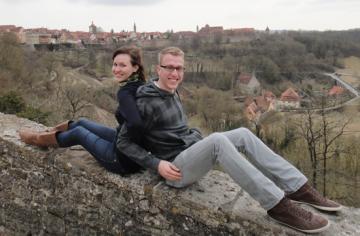European exchange program blends co-op and academic exchange
- Joy Poliquin

When Alicia Butula was searching for an international co-op work experience, she knew she wanted more than a trip abroad. The UVic social sciences co-op student wanted to truly experience the culture and community of her exchange destination. She wanted a guide, and found the perfect solution when she discovered UVic's CANEU-COOP exchange program.
Butula is one of 15 UVic students who have participated in the CANEU-COOP project since it was launched in 2009. The project is a partnership among UVic's Co-operative Education Program and Career Services office (Co-op and Career), its counterpart at the University of Waterloo in Canada, as well as FH Joanneum University of Applied Sciences in Austria and Duale Hochschule Baden-W&u#168;rttemberg Co-operative State University in Germany.
CANEU-COOP uses a hybrid exchange model that "twins" Canadian and European students. First, European students are matched with their Canadian "twins;" they then come to Canada to complete academic terms at UVic and Waterloo where they are supported by the Canadian students. The following term, the UVic and European "twin pairs" return to Germany or Austria and complete co-op work terms with, in the majority of cases, the same companies so that the twinning continues into that term. The program has been primarily open to engineering students, although some exceptions have been made to accommodate students in other programs, such as Butula, who is studying social sciences.
CANEU-COOP is more than a simple exchange program-it has a unique research component that measures the development of students' cross-cultural competencies during their international experience using the Cultural Intelligence Scale (© Cultural Intelligence Centre).
"What we have in CANEU-COOP is an incredible opportunity for students to develop their cross-cultural competencies and create life-long friendships through the eight-month twinning model" says Karima Ramji, UVic Co-op and Career's international coordinator who also manages the project at UVic. "The students have a built-in support network when they're away from home; in some cases, students even stay with their "twin's" family.
This was the case for Butula, whose European twin's parents welcomed her to live with them during her stay in Germany. When she arrived, the German partner university arranged for her to take German classes, which helped her adapt to a foreign workplace.
"I've been working for the corporate component of Carl Zeiss, a manufacturer of optical systems and industrial and medical devices. My tasks have included tracking social and environmental trends that affect business operations, product distribution and the increasing importance of sustainability monitoring," says Butula. "Participation in the CANEU-COOP program has been great. I enjoy living and working in a foreign international workplace and the opportunity to travel and learn German. I've enjoyed my time so much that I accepted a job extension for summer 2012."
Ramji and Co-op and Career Executive Director Norah McRae recognize that experiences like Butula's have incredible promise. They have co-authored a chapter in the World Association for Co-operative Education's International Handbook for Cooperative and Work-Integrated Education in which they introduce the notion of cultural intelligence and consider how international work placements enhance students' cross cultural competencies to make them more employable.
Since the launch of CANEU-COOP in 2009, 61 students from the four partner institutions have participated in the program. Although the project was initially funded by Human Resources and Skills Development Canada, which provided stipends to Canadian participants, funding will end in April. Nonetheless, UVic, Waterloo and the existing European partner institutions plan to seek new funding opportunities with the goal to continue and even expand the project. Beginning in fall 2013, the program will be expanded to include health information, business and other students.
Research on cross-cultural competencies will also continue for the next three years, thanks to funding in the amount of $48,000 provided by the University of Waterloo's Centre for the Advancement of Co-operative Education.
For more information about CANEU-CO-OP, contact Karima Ramji at ramjik@uvic.caor visit www.uvic.ca/coopandcareer/employerfunding.

